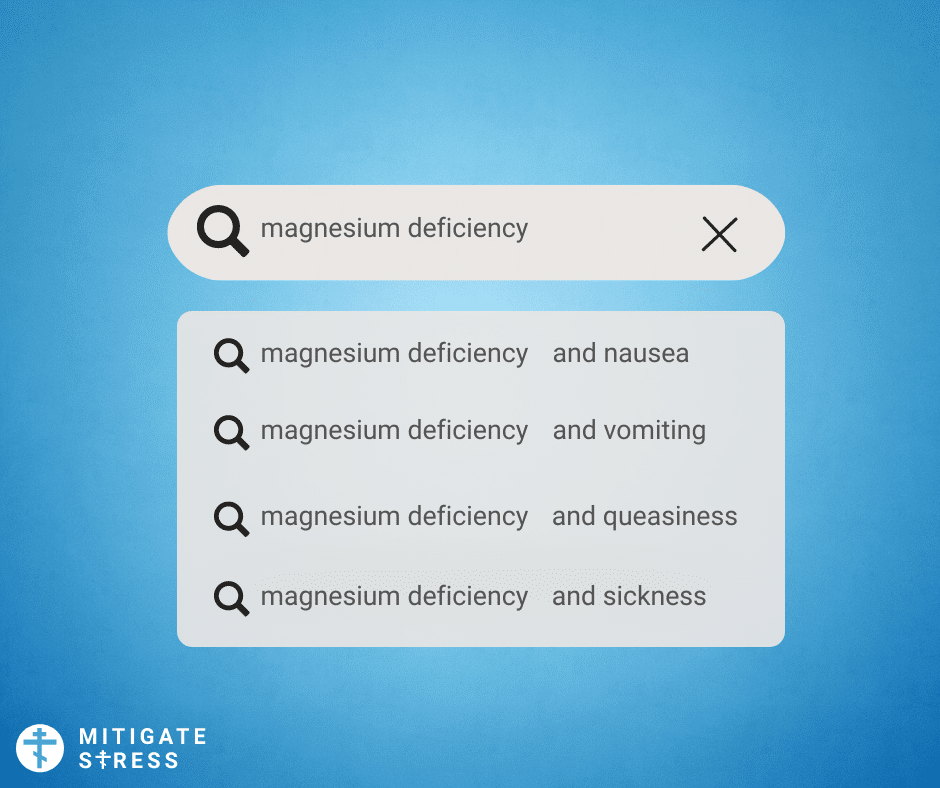Magnesium, an essential mineral, plays a key role in hundreds of biochemical reactions within our body. Despite its importance, magnesium deficiency is more common than one might think, often manifesting in various symptoms like nausea and vomiting1. This article aims to provide an in-depth exploration into the connection between magnesium deficiency and these symptoms, underpinned by findings from scientific research.
The Vital Role of Magnesium
Magnesium is crucial for many bodily functions, including energy production, muscle contractions, nerve function, and blood pressure regulation2. A deficiency in this vital nutrient can have far-reaching effects on one’s health, often leading to symptoms such as nausea and vomiting.
The Connection: Magnesium Deficiency, Nausea, and Vomiting
Research suggests a strong correlation between magnesium deficiency and the prevalence of nausea and vomiting. Studies have shown that maintaining adequate magnesium levels could substantially decrease the incidence of these symptoms3. One study even found that patients on long-term diuretic therapy for heart failure, which can cause magnesium loss, were more likely to experience symptoms such as chronic vomiting4.
Interestingly, magnesium has been proposed to play a role in the pathophysiology of migraines, a condition often associated with nausea and vomiting. In fact, one study found that patients with acute migraine attacks who were administered magnesium sulfate reported a decrease in the severity of pain and nausea5.
Recognizing Magnesium Deficiency
Aside from nausea and vomiting, other symptoms associated with magnesium deficiency include fatigue, weakness, loss of appetite, and muscle cramps6. More severe deficiency can lead to numbness, tingling, seizures, personality changes, and abnormal heart rhythms7.
However, recognizing magnesium deficiency can be challenging, as the symptoms are non-specific and often overlap with other conditions. Therefore, it’s important to consult a healthcare provider if you suspect a deficiency.
Ensuring Adequate Magnesium Intake
Magnesium-rich foods are a proactive step towards preventing deficiency. Foods high in magnesium include dairy, green leafy vegetables, whole grains, nuts, seeds, and legumes8.
For some, dietary changes may not be enough, and supplementation may be necessary. However, it is crucial to discuss this with a healthcare provider before starting any supplementation regimen, as excessive magnesium can also have adverse effects.
If you’re looking for a convenient way to boost your magnesium intake, check out our range of products. Our Master Mineral Drink, MMD Travel, Magnesium Bath, and Magnesium Oil are specially formulated to supplement your magnesium levels. These products provide the most bioavailable and absorbable forms of magnesium, ensuring that your body gets the most out of this essential mineral.
Whether you’re at home or on the go, our magnesium products make it easy to maintain balanced magnesium levels for better health and well-being. Take charge of your health today with our top-notch products.
Conclusion
Magnesium is an essential nutrient that our bodies need to function optimally. Its deficiency can lead to several symptoms, including nausea and vomiting. By understanding the signs of deficiency and ensuring adequate intake, we can safeguard our health and well-being.
Remember, if you suspect a magnesium deficiency, consult with a healthcare provider for an accurate diagnosis and treatment plan.
Footnotes
- Google Books: Magnesium in human health and disease
- ScienceDirect: The multifaceted and widespread pathology of magnesium deficiency
- Academic Oxford Journals: Magnesium: an emerging drug in anaesthesia
- BMJ: Magnesium deficiency in patients on long-term diuretic therapy for heart failure
- Headache Journal: Efficacy of intravenous magnesium sulfate in the treatment of acute migraine attacks
- MDPI: Magnesium in prevention and therapy
- MDPI: Myth or reality—transdermal magnesium?
- Taylor & Francis Online: Combating COVID-19 and building immune resilience: a potential role for magnesium nutrition?






0 Comments